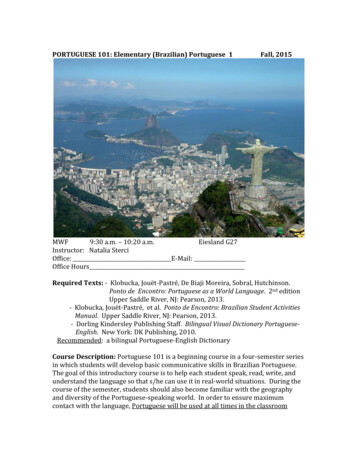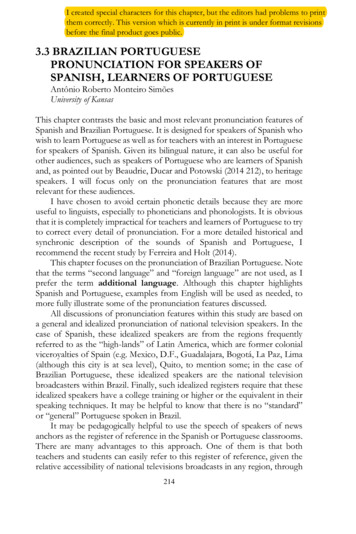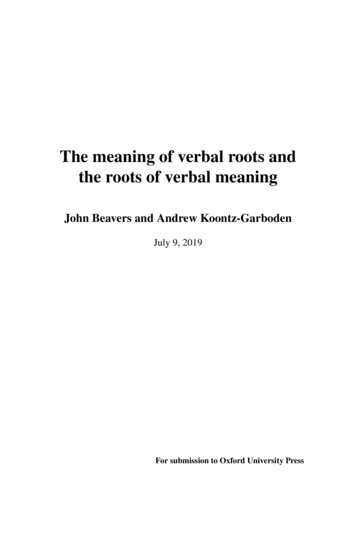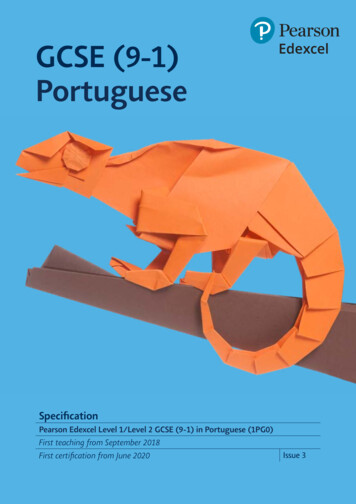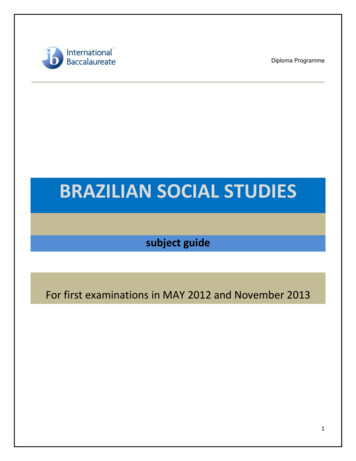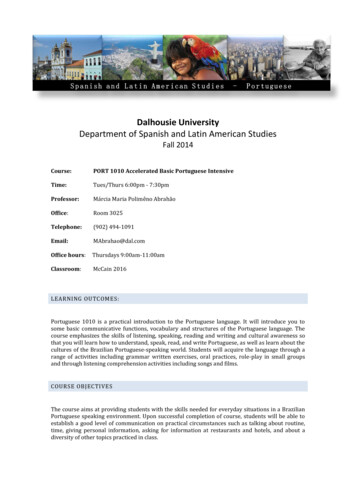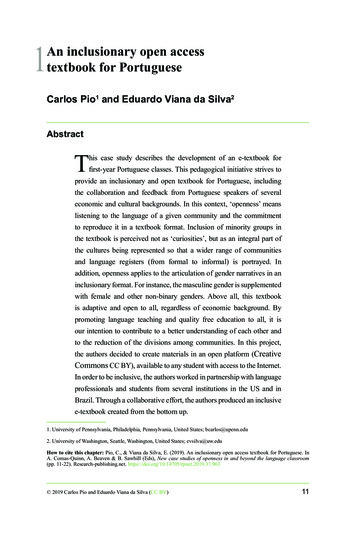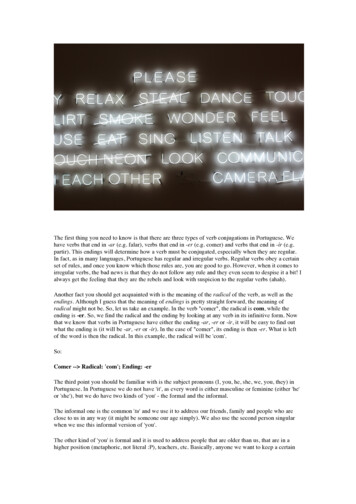
Transcription
The first thing you need to know is that there are three types of verb conjugations in Portuguese. Wehave verbs that end in -ar (e.g. falar), verbs that end in -er (e.g. comer) and verbs that end in -ir (e.g.partir). This endings will determine how a verb must be conjugated, especially when they are regular.In fact, as in many languages, Portuguese has regular and irregular verbs. Regular verbs obey a certainset of rules, and once you know which those rules are, you are good to go. However, when it comes toirregular verbs, the bad news is that they do not follow any rule and they even seem to despise it a bit! Ialways get the feeling that they are the rebels and look with suspicion to the regular verbs (ahah).Another fact you should get acquainted with is the meaning of the radical of the verb, as well as theendings. Although I guess that the meaning of endings is pretty straight forward, the meaning ofradical might not be. So, let us take an example. In the verb "comer", the radical is com, while theending is -er. So, we find the radical and the ending by looking at any verb in its infinitive form. Nowthat we know that verbs in Portuguese have either the ending -ar, -er or -ir, it will be easy to find outwhat the ending is (it will be -ar, -er or -ir). In the case of "comer", its ending is then -er. What is leftof the word is then the radical. In this example, the radical will be 'com'.So:Comer -- Radical: 'com'; Ending: -erThe third point you should be familiar with is the subject pronouns (I, you, he, she, we, you, they) inPortuguese. In Portuguese we do not have 'it', as every word is either masculine or feminine (either 'he'or 'she'), but we do have two kinds of 'you' - the formal and the informal.The informal one is the common 'tu' and we use it to address our friends, family and people who areclose to us in any way (it might be someone our age simply). We also use the second person singularwhen we use this informal version of 'you'.The other kind of 'you' is formal and it is used to address people that are older than us, that are in ahigher position (metaphoric, not literal :P), teachers, etc. Basically, anyone we want to keep a certain
educated distance from (again metaphorical). For this, we use the formal 'você' and besides this, we usethe third person, instead of the second. It is like we are speaking about another person and not directly at the personin front of us (although we actually really are). So, we will say something like "Does the lady wantanything?". It seems we are speaking about someone else, someone that is not present in theconversation, but actually we are speaking to the person in front of us.'Você' is just the standard formal 'you' that we use to explain the use of the third person and the use ofthe formal manner to students. However, in nowadays Portugal, 'você' is considered as a nonprestigious way of speaking and we prefer to use 'O senhor' (the gentleman) or 'a senhora' (the lady) toaddress someone formally. If we do not want to sound AS formal, we can use the person s first name,like 'A Ana' or 'O Luís'. This creates a distance as it will sound something like 'Does Luís wantanything?'. It will sound again like we are speaking to someone who is not present in the conversation,but actually Luís is the person who is right in front of us and who is listening to us. We are just usingthe third person to create the formal distance between the interlocutors.Just a last fact. To say "you all" the traditional way would be to use the word 'vós'. I find it importantthat you know it, because it does exist and you might come across it. However, this is no longer verywidely used and we transformed it into 'vocês' (not to be confused with 'você', which is the singular'you' formal) and we use the same conjugation, as we use to "they". Take a look below.Ok, now that you have the hard-facts, let us get into this beautiful conjugation world.As this topic is really vast, today we will cover.The conjugation of regular verbs in the Present Simple, Perfect and Imperfect tenses!
#Presente Simples do Indicativo(verbs ending in) -arWith this set of verbs, you should take the radical of the verb and add the following endings: oasaamosamamSo, let us take an example.Verbo falar (to speak)Eu (I) faloTu (you) falasVocê (you formal) falaEle (He) falaEla (She) falaNós (We) falamos(Vós (you all) falais - not very widely used anymore)Vocês (You all) falamEles (They - masc.) falamElas (They - fem.) falam(verbs ending in) -erFor this second conjugation of verbs ending in -er, you should take the radical of the verb and add thefollowing endings: oeseemosememAs you can see, it is pretty much the same as the verbs ending in -er, but instead of using an 'a', we usean 'e'. Let us see an example:Verbo comer (to eat)
Eu comoTu comesEle/ Ela/ Você comeNós comemos(Vós (you all) comeis)Vocês comemEles/Elas comem(verbs ending in) -irFinally, verbs ending in this conjugation should have the following endings: oeseimosememAs you can see, it is exactly the same as verbs ending in -ir, except for the "we" form, which is -imosinstead of -emos. Here is an example:Verbo abrir (to open)Eu abroTu abresEle/Ela/Você abreNós abrimos(Vós abris)Vocês abremEles/ Elas abrem
#Pretérito Perfeito do IndicativoThis tense is used to speak about something that happened in a fixed point in time in the past and it isover now. It is the equivalent to the Past Simple in English. With no further ado, here are theconjugations for -ar, -er and -ir:-ar eiasteou(example - verbo falar: Eu falei, Tu falaste, Ele falou, Nós falamos, Vocêsfalaram, Eles falaram)amosaramaram-er iesteeu(example - verbo comer: Eu comi, Tu comeste, Ele comeu, Nós comemos, Vocêscomeram, Eles comeram)emoserameram-ir iisteiu(example - verbo abrir: Eu abri, Tu abriste, Ele abriu, Nós abrimos, Vocês abriram,Eles abriram)imosiramiramAgain, if you notice there is not a big difference between them , and you just need to focus on the slightdifference in letters, which mainly has to do with the ending letters in the infinitive form.
#Pretérito Imperfeito do IndicativoThis tense has a more complicated use, as it does not have any direct equivalent in English. The closesttense in English, would maybe be "I used to". In fact, this tense is used to talk about facts thathappened for a period of time or frequently in the past. If we want to say "When I was little, I alwaysused to eat at my grandma s house", I will use this tense as follows "Quando eu era pequenina, eucomia sempre em casa da minha avó". As you see, we did not use the simple past - 'comi' - but insteadwe used the Pretérito Imperfeito do Indicativo.As you can see, in the previous example, we are also speaking about a description in the past. This isalso why we use this tense. If I want to say, for example, "When I was young, I had long hair and I wasthin", I would also use this tense saying "Quando eu era nova, eu tinha cabelo comprido e era magra".In this example all the verbs are irregular (verbos ser and ter) but they are all in the imperfect tense.You can already have a sneak a pick on the irregular forms. However, the lesson I want you to take isthat if you want to make descriptions of the past, Pretérito Imperfeito is the tense you will use.We also use this tense to make polite requests. If you go to a restaurant, you will not say (as it is a bitimpolite) "Quero um café" (I want a coffee), but rather "Queria um café" (I would like a coffee). Inthis cases we use the verbs - gostar de (to like), querer (to want), preferir (to prefer), desejar (to wishfor), poder (can).Here are the conjugations:-ar avaavasava(example - verbo falar: Eu falei, Tu falaste, Ele falou, Nós falamos, Vocêsfalaram, Eles falaram)ávamosavamavam-er iaiasia(example - verbo comer: Eu comi, Tu comeste, Ele comeu, Nós comemos, Vocêscomeram, Eles comeram)íamosiamiam-ir iaiasia(example - verbo abrir: Eu abri, Tu abriste, Ele abriu, Nós abrimos, Vocês abriram,Eles abriram)íamosiamiam
As you can see, the conjugation for regular verbs ending in -er and -ir is the same. The only differenceis for verbs ending in -ar. Not so difficult, huh?So, how do you feel so far? For now we will stop here as I do not want you to feel overwhelmed. In my'materials' section, you will soon be able to find this post in a printable version and also some exercisesrelated to this topic. Just press here .How is your study going? Do you want to share it with us in the comments section below? I would behappy to hear it! Also, if you have any questions, do not hesitate to ask! I will try to answer all of them )Thank you and see you soon!Beijinhos,MiaAll rights reserved to www.learn-portuguese.orgFor any questions, please contact mia@learn-portuguese.org
Portuguese. In Portuguese we do not have 'it', as every word is either masculine or feminine (either 'he' or 'she'), but we do have two kinds of 'you' - the formal and the informal. The informal one is the common 'tu' and we use it to address our friends, family and people who are clo

